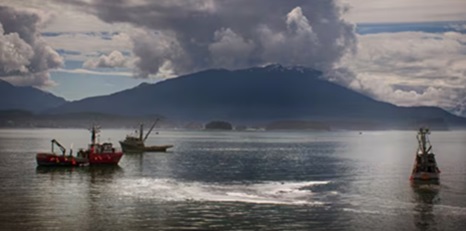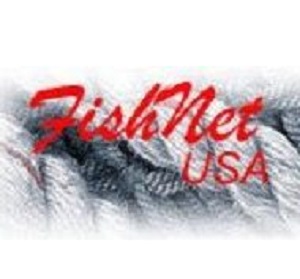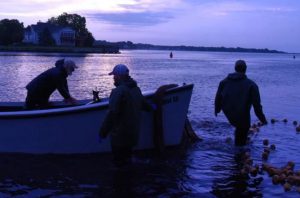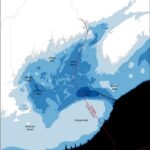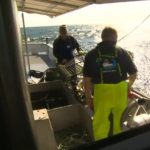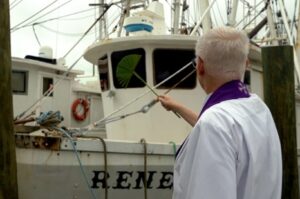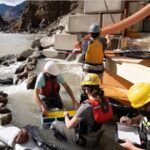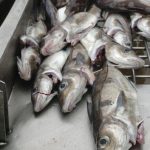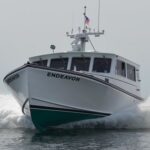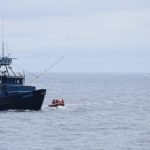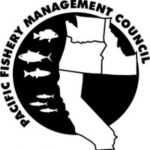Tag Archives: bycatch
A Rebuttal to a Recent Commentary: Alaska trawl fisheries are vital and under attack by those using myths
 This campaign to ban trawling – a sustainable fishing method responsible for a substantial majority of fishery landings in the Alaska Region and nationally – poses a direct threat to Alaska’s coastal economy, seafood sector and way of life. If you enjoy wild seafood – fish sandwiches or shrimp; fish sticks or scallops; fish tacos or rockfish – you are enjoying seafood caught by “trawl” or “dredge” fishing gears that touch the seafloor. It’s true that these fishing methods, like every farm, aquaculture facility and fishing operation on the planet, impact the environment. But, what’s also true is that the impacts of trawl fishing in Alaska are continually monitored to ensure long-term ecosystem health. The recent commentary authored for the Alaska Beacon by Heather Sauyaq Jean Gordon and David Bayes is the latest effort to demonize sustainable trawl fisheries. Like other attacks on our sector, the commentary comes from a vocal few that play fast and loose with the facts. By Sam Wright, more, >>CLICK TO READ<< 11:43
This campaign to ban trawling – a sustainable fishing method responsible for a substantial majority of fishery landings in the Alaska Region and nationally – poses a direct threat to Alaska’s coastal economy, seafood sector and way of life. If you enjoy wild seafood – fish sandwiches or shrimp; fish sticks or scallops; fish tacos or rockfish – you are enjoying seafood caught by “trawl” or “dredge” fishing gears that touch the seafloor. It’s true that these fishing methods, like every farm, aquaculture facility and fishing operation on the planet, impact the environment. But, what’s also true is that the impacts of trawl fishing in Alaska are continually monitored to ensure long-term ecosystem health. The recent commentary authored for the Alaska Beacon by Heather Sauyaq Jean Gordon and David Bayes is the latest effort to demonize sustainable trawl fisheries. Like other attacks on our sector, the commentary comes from a vocal few that play fast and loose with the facts. By Sam Wright, more, >>CLICK TO READ<< 11:43
Unalaska, Aleutians East Borough oppose Rep. Peltola’s proposed trawling limitations
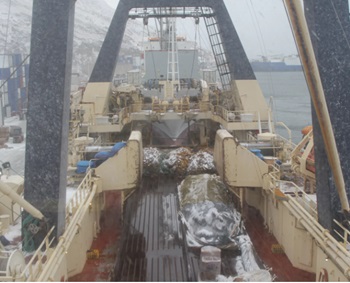 Communities in the Aleutians are pushing back against proposed legislation that would bring stricter regulations to the Bering Sea trawl fishery. The City of Unalaska and the Aleutians East Borough are among 53 organizations that signed onto a letter sent to U.S. Rep. Mary Peltola, urging her to withdraw H.R. 8507, a bill she sponsored in May. The proposed legislation aims to add new regulations to where trawling can take place across the United States, not only in Alaska. Trade organizations and some coastal communities whose economies rely on trawl fisheries have pushed back against the bill, asking the congresswoman to repeal it. “If enacted, H.R. 8507 would directly harm fishermen and coastal communities in Alaska and throughout our nation, along with countless other people who rely on a healthy domestic seafood sector for food, jobs, and their way of life,” the letter said. more, >>CLICK TO READ<< 13:28
Communities in the Aleutians are pushing back against proposed legislation that would bring stricter regulations to the Bering Sea trawl fishery. The City of Unalaska and the Aleutians East Borough are among 53 organizations that signed onto a letter sent to U.S. Rep. Mary Peltola, urging her to withdraw H.R. 8507, a bill she sponsored in May. The proposed legislation aims to add new regulations to where trawling can take place across the United States, not only in Alaska. Trade organizations and some coastal communities whose economies rely on trawl fisheries have pushed back against the bill, asking the congresswoman to repeal it. “If enacted, H.R. 8507 would directly harm fishermen and coastal communities in Alaska and throughout our nation, along with countless other people who rely on a healthy domestic seafood sector for food, jobs, and their way of life,” the letter said. more, >>CLICK TO READ<< 13:28
State and federal fisheries concerns addressed at Peltola public meeting
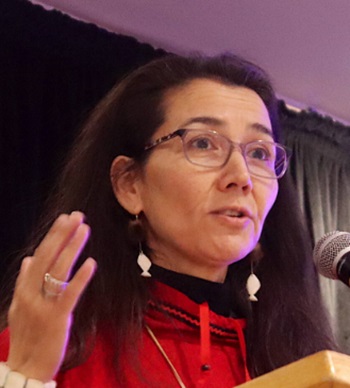 U.S. Rep. Mary Peltola, D-Alaska, held a fish-focused telephone town hall meeting on Thursday, June 20, during which people from across the state voiced concerns related to both state and federal fisheries. Those who called into the meeting, identified by first name only, provided both questions to Peltola and general comments. Callers expressed frustration with what they said were mixed messaging in fisheries management, the lack of understanding among elected officials, and the need for bipartisan work in addressing these issues. H.R. 8508, sponsored by Peltola and two others, authorizes National Oceanic and Atmospheric Administration to reauthorize their Bycatch Reduction and Engineering Program. The bill was referred to the House Committee on Natural Resources in May. more, >>CLICK TO READ<< 09:17
U.S. Rep. Mary Peltola, D-Alaska, held a fish-focused telephone town hall meeting on Thursday, June 20, during which people from across the state voiced concerns related to both state and federal fisheries. Those who called into the meeting, identified by first name only, provided both questions to Peltola and general comments. Callers expressed frustration with what they said were mixed messaging in fisheries management, the lack of understanding among elected officials, and the need for bipartisan work in addressing these issues. H.R. 8508, sponsored by Peltola and two others, authorizes National Oceanic and Atmospheric Administration to reauthorize their Bycatch Reduction and Engineering Program. The bill was referred to the House Committee on Natural Resources in May. more, >>CLICK TO READ<< 09:17
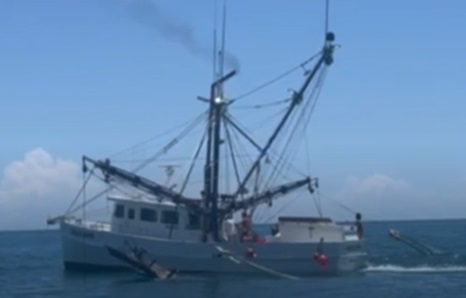
North Carolina: Debates over ending inshore trawling to protect marine life
For commercial fishermen like Thomas Smith, who works in the Pamlico Sound, shrimp trawling is essential for their livelihood. “Most of our income comes between July and November while working on inshore waters,” says Smith. He said that keeping shrimp trawling operations only in the ocean would only be viable for about two months each year, potentially devastating his business. “It would put me out of business,” he adds. Tim Gestwicki, CEO of the NCWF, supports ocean shrimp trawling but insists that inshore trawling must be stopped to protect juvenile fish species, such as the Southern flounder. “It’s time for us to catch up with the times and quit squandering our resources unnecessarily,” said Gestwicki. Video, more, >>CLICK TO READ<< 09:37
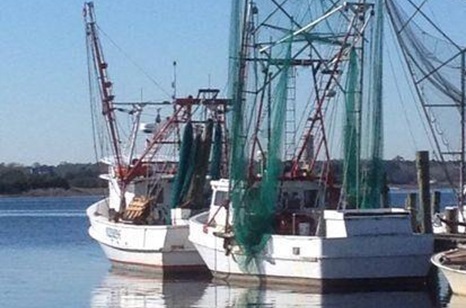
N.C. Wildlife Federation calls for inshore shrimp trawling ban, commercial fisheries lobbying group responds
N.C. Wildlife Federation CEO Tim Gestwicki called on state legislators Tuesday to “put a stop to inshore shrimp trawling as soon as possible.” In a news release, Gestwicki said the call is in response to the N.C. Division of Marine Fisheries canceling the recreational southern flounder season for 2024. Glenn Skinner, executive director of the N.C. Fisheries Association, a Morehead City-based trade and lobbying group for the state’s commercial fishermen, said Tuesday the wildlife federation is using the flounder season cancellation to scare fishermen and “build momentum” for its ongoing effort to ban shrimp trawling. The recreational fishermen exceeded the quota in 2023, he said, but commercial fishermen, who also had a short season, did not. more, >>CLICK TO READ<< 17:48
Alaska’s declining crab population due to trawlers catches attention of lawmaker
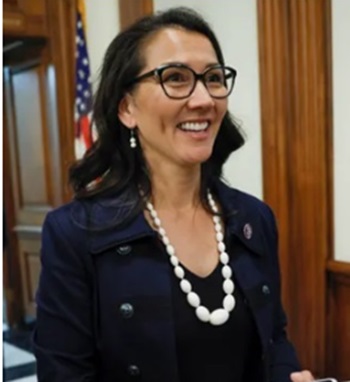 Alaska Rep. Mary Peltola’s mounting frustration with the largely Seattle-based pollock industry’s decades-old issue of inadvertently damaging the state’s rapidly declining crab populations and critical habitat for many other species may result in legislation a move heralded by the scientific and conservation communities. Members of the scientific community concerned with sustainability and conservation are currently in a deadlock with industrial pollock trawler fleets and the North Pacific Fishery Management Council over federal fishery regulations, including pelagic, or “mid-water” trawling, which uses wide-mouthed nets designed to target schools of Bering Sea Alaskan pollock. The Alaska Marine Conservation Council released a report in February 2023 analyzing the trawlers’ impact on red king crab habitats following the 2022 closure of the Alaska snow crab fisheries, which is still ongoing, and a two-year closure for Bristol Bay king crab that ended in 2023, underscoring the devastating environmental and financial toll. more, >>CLICK TO READ<< 19:17
Alaska Rep. Mary Peltola’s mounting frustration with the largely Seattle-based pollock industry’s decades-old issue of inadvertently damaging the state’s rapidly declining crab populations and critical habitat for many other species may result in legislation a move heralded by the scientific and conservation communities. Members of the scientific community concerned with sustainability and conservation are currently in a deadlock with industrial pollock trawler fleets and the North Pacific Fishery Management Council over federal fishery regulations, including pelagic, or “mid-water” trawling, which uses wide-mouthed nets designed to target schools of Bering Sea Alaskan pollock. The Alaska Marine Conservation Council released a report in February 2023 analyzing the trawlers’ impact on red king crab habitats following the 2022 closure of the Alaska snow crab fisheries, which is still ongoing, and a two-year closure for Bristol Bay king crab that ended in 2023, underscoring the devastating environmental and financial toll. more, >>CLICK TO READ<< 19:17
Western Alaska tribes, outraged by bycatch, turn up the heat on fishery managers and trawlers
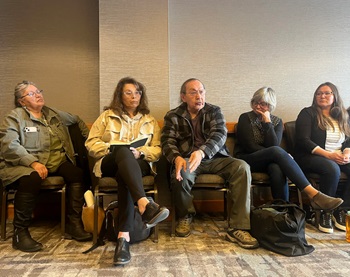 Earlier this spring, Maurice McGinty, a tribal leader from the village of Nulato, pulled out his last mason jar of smoked Yukon king. “We have no more now,” said McGinty, 80. He added: “They are pushing us, and our traditional way of life, into a hole.” Imagine hearing and reading versions of McGinty’s story dozens of times, told by Indigenous people who live along the Yukon and another iconic subsistence river in Southwest Alaska, the Kuskokwim. That’s the reality this week for the policymakers on the North Pacific Fishery Management Council, the federal commission that regulates commercial fishing in the American waters of the Bering Sea. On one side are tribal leaders from the Yukon and Kuskokwim, On the other side are representatives for the trawlers, more, >>click to read<< 13:51
Earlier this spring, Maurice McGinty, a tribal leader from the village of Nulato, pulled out his last mason jar of smoked Yukon king. “We have no more now,” said McGinty, 80. He added: “They are pushing us, and our traditional way of life, into a hole.” Imagine hearing and reading versions of McGinty’s story dozens of times, told by Indigenous people who live along the Yukon and another iconic subsistence river in Southwest Alaska, the Kuskokwim. That’s the reality this week for the policymakers on the North Pacific Fishery Management Council, the federal commission that regulates commercial fishing in the American waters of the Bering Sea. On one side are tribal leaders from the Yukon and Kuskokwim, On the other side are representatives for the trawlers, more, >>click to read<< 13:51
‘Freaked out’: Big money industry crippling salmon population in Alaska, natives say
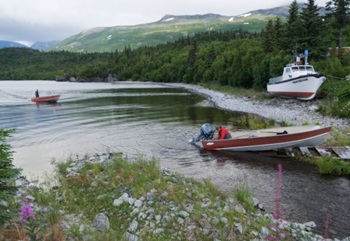 There is no more salmon. That’s what native Alaskan Ricko DeWilde is most concerned with these days. Once flowing with abundance, native tribes have been sounding the alarm about the overfishing of Alaskan Ricko DeWilde and other native fish by international fishing companies, essentially wiping out natives’ main source of food as well as a cultural touchstone. “That’s a way of life that we’re losing right there,” DeWilde said. “Any of the fishing along the Yukon River has been prohibited,” DeWilde said. “The commercial fishing industry is just running rampant out here and it’s big money. They take over to board of fish, they take over to politicians, they have them in their pocket and it becomes like a fish mafia out here.” photos, >>click to read<< 08:08
There is no more salmon. That’s what native Alaskan Ricko DeWilde is most concerned with these days. Once flowing with abundance, native tribes have been sounding the alarm about the overfishing of Alaskan Ricko DeWilde and other native fish by international fishing companies, essentially wiping out natives’ main source of food as well as a cultural touchstone. “That’s a way of life that we’re losing right there,” DeWilde said. “Any of the fishing along the Yukon River has been prohibited,” DeWilde said. “The commercial fishing industry is just running rampant out here and it’s big money. They take over to board of fish, they take over to politicians, they have them in their pocket and it becomes like a fish mafia out here.” photos, >>click to read<< 08:08
New tech designed with Cornish fishermen to transform bycatch monitoring
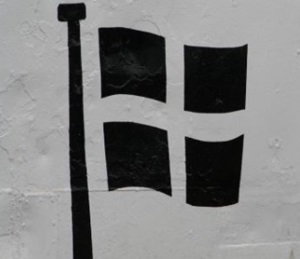 An innovative new tool being developed with fishermen in Cornwall aims to radically transform how by-catch is documented on board fishing vessels and, ultimately, prevent it happening. In a UK-first, Insight360 combines voice recognition and video information to deliver real-time insight and create a 360-degree view of what’s happening at sea during a by-catch event, that continuously improves over time. Refined with fishermen, the technology removes the need to manually review and add notes to footage, offering instead a way for skippers and crews to train a monitoring system to automatically recognise and record bycatch events as they happen. >>click to read<< 08:19
An innovative new tool being developed with fishermen in Cornwall aims to radically transform how by-catch is documented on board fishing vessels and, ultimately, prevent it happening. In a UK-first, Insight360 combines voice recognition and video information to deliver real-time insight and create a 360-degree view of what’s happening at sea during a by-catch event, that continuously improves over time. Refined with fishermen, the technology removes the need to manually review and add notes to footage, offering instead a way for skippers and crews to train a monitoring system to automatically recognise and record bycatch events as they happen. >>click to read<< 08:19
With little movement on salmon bycatch, Alaska advocates look to Biden administration for executive action
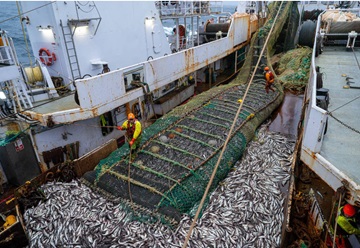 Amid catastrophic shortfalls in salmon harvests in some of Alaska’s rural, Indigenous communities, advocates have pleaded for a crackdown on unintentional catch of those same salmon by the trawl vessels that harvest billions of pounds of whitefish in the Bering Sea. But the politically appointed regional council that manages Bering Sea fisheries has largely resisted those requests. So instead, advocates are now taking another approach. They’re pushing the Biden administration for a workaround: a rewrite of the federal guidelines that tell the regional council, and its counterparts across the country, how to manage all the fisheries under their supervision. >>click to read<< 18:40
Amid catastrophic shortfalls in salmon harvests in some of Alaska’s rural, Indigenous communities, advocates have pleaded for a crackdown on unintentional catch of those same salmon by the trawl vessels that harvest billions of pounds of whitefish in the Bering Sea. But the politically appointed regional council that manages Bering Sea fisheries has largely resisted those requests. So instead, advocates are now taking another approach. They’re pushing the Biden administration for a workaround: a rewrite of the federal guidelines that tell the regional council, and its counterparts across the country, how to manage all the fisheries under their supervision. >>click to read<< 18:40
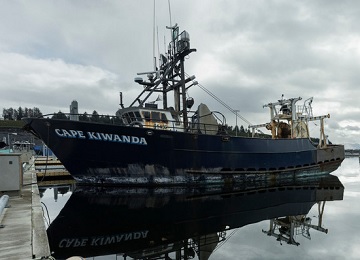
In Depth: Alaska’s Fisheries Are Collapsing. This Congresswoman Is Taking on the Industry She Says Is to Blame.
The late 1990s and early 2000s were boomtimes for halibut fishermen in Alaska. Over 80 million pounds of the flatfish were being harvested annually. Deckhands could earn $250,000 a season. The small boat harbor in the southcentral city of Homer, known as the “halibut capital of the world,” was bustling. Erik Velsko, 39, was one of those fishermen. He started buying annual shares in 2001 when the halibut population was at near historic highs. But within a few years, the stock plummeted by more than half and the quotas for commercial fishermen were slashed accordingly. Halibut wasn’t the only so-called directed fishery to experience such a catastrophic drop. The crab fleet — made famous in the reality show “Deadliest Catch” — has been mostly stuck in port for two years after the near total collapse of the snow crab population and the decades long decline of red king crab. Photos, >click to read< 11:42
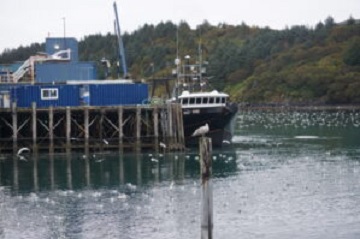
Bycatch task force considers new rules, more research to protect Alaska fish intercepted at sea
In the search for a solution to the problem of bycatch, the unintended at-sea harvest of non-target species, the stakes in Alaska are high. Now a special task force is nearing the end of a year-long process to find solutions that satisfy competing interests to the problem of bycatch, which refers to fish that are caught incidentally by commercial fishers who are targeting other fish. The Alaska Bycatch Review Task Force, created by Gov. Mike Dunleavy last November, is due to release its final report by the end of next month. At least two additional meetings are to be held between now and then. >click to read< 11:50
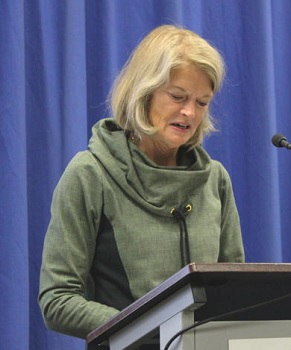
Bycatch stirs debate at fisheries roundtable
Hosted at Kenai Peninsula College by the Kenai River Sportfishing Association, the three-hour event brought together a who’s-who lineup of fisheries and policy experts from Alaska. That lineup included Alaska Department of Fish and Game Commissioner Doug Vincent-Lang, who said Bering Sea trawling is not responsible for Alaska’s declining chinook salmon runs. The Magnuson-Stevens Fishery Conservation and Management Act defines bycatch as fish harvested in a fishery that are not sold or kept for personal use. The phrase is sometimes used generally to refer to the capture of fish that are not being targeted by a specific fishery that are discarded. >click to read< 09:59
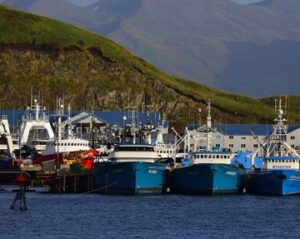
Regardless of party or office, Alaska candidates are targeting trawling
Republicans, Democrats and independents seeking a variety of elected offices across Alaska appear united by a desire to restrict deep-sea trawling. In candidate questionnaires submitted to the Alaska Beacon, candidates for statewide and legislative races, regardless of party, say the restrictions are the best way to improve salmon returns on the Yukon and Kuskokwim rivers. “I support efforts to reduce the wasteful bycatch of Alaska’s seafood by Seattle-based high seas fishing corporations,” said Mary Peltola, the Democratic candidate for Alaska’s U.S. House seat. “Science provides the best guide. However, I think most Alaskans agree it is past time to get high seas trawler bycatch under control,” said Tuckerman Babcock, a Republican candidate for an Alaska Senate district on the Kenai Peninsula. >click to read< 19:46
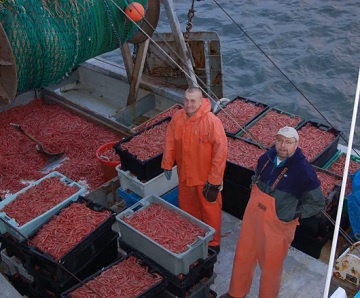
How warming ocean temperatures wiped out Maine’s shrimp industry
Since 2014 fishing for northern shrimp has been banned in the United States. The stock in our area has decreased to the point where they are not reproducing. This is not due to overfishing; it is directly due to the temperature of the water. They have simply moved north to colder Canadian waters. Back in 2007, when there was a robust northern shrimp fishery in the Gulf of Maine, scientists were looking for net modifications that would catch shrimp but not have any bycatch of finfish. Since shrimp fisheries throughout the world have some of the highest bycatch of any fishery, this was a priority worldwide. At that time the Northeast Consortium at the University of New Hampshire helped fund research by Dr. Pingguo. He and David Goethel developed a trawl net, named “The Topless Trawl,” that drastically reduced bycatch in the northern shrimp fishery. >click to read< 10:21
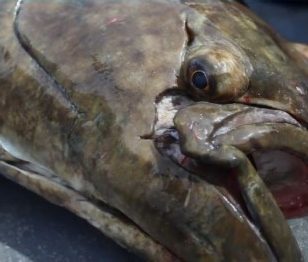
Bycatch task force works to refine mission ahead of November deadline
Bycatch is when fishing vessels catch something they’re not targeting. It could be tanner crab caught in a black cod pot, or halibut scooped up in a pollock trawl net. It’s been an incendiary issue in Alaska’s fisheries for decades. Now, as stocks of crab, salmon and halibut decline, trawl fisheries have come under fire for their role, which represents the vast majority of incidental catch in and around Alaska. The governor’s office took notice. Gov. Mike Dunleavy established a task force to review bycatch late last year with a deadline of November to submit its recommendations. But during that time, the Alaska Bycatch Review Task Force also has to establish its own priorities, break into subcommittees, and decide what it’s going to focus on before its mandate expires in just nine months. And there’s a lot of information to sort through already as it plays catch-up. >click to read< 11:01
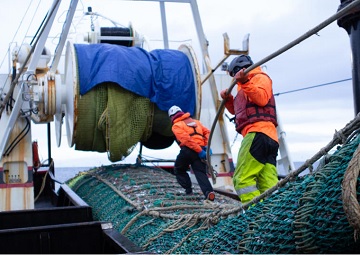
Dunleavy administration announces formation of bycatch task force
“We’ve had a reduction in or closure of the crab fisheries in the Bering Sea. The [North Pacific Fishery Management] Council is discussing how to deal with halibut bycatch, and I think there’s a lot of perception that there are bycatch issues associated with what’s happened with salmon in Western Alaska systems,” said Alaska Fish & Game Commissioner Doug Vincent-Lang. And, he says, his boss has taken notice. “I think the governor was hearing loud and clear that there was just a lot of noise around the issue of bycatch,” >click to read< 12:52
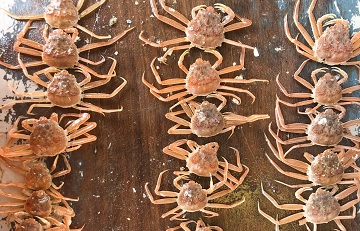
Alaska snow crab harvest slashed by nearly 90% after population crash in a warming Bering Sea
The snow crab is a mainstay of the Alaska crab boat fleet, much of it based in Washington, and the 2021-22 catch limit of 5.6 million pounds, announced Friday, is down 88% from the previous season. The 2021 fall harvest of Bristol Bay red king crab, another important source of revenue for that fleet, was canceled for this year because of too few females. The combined impacts of the closure and snow crab cutbacks are a big financial hit to crabbers who in past years have grossed more than $200 million from the two harvests. At a meeting of the North Pacific Fishery Management Council this week, crabbers called for additional restrictions in other harvests. >click to read< 09:30
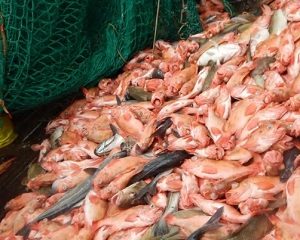
Canada adds warm-water fish to list of species monitored in DFO summer trawl survey off East Coast
Several warm-water fish species were added to the annual summer research vessel survey off the coast of Eastern Canada in 2020.,, Monitoring for the blackbelly rosefish, john dory, trigger fish, tilefish fish, dusky shark and others was included in the DFO summer trawl survey along the Scotian Shelf and Bay of Fundy for the first time last year. It was done at the request of the commercial fishing industry, which is capturing them accidentally, called bycatch, but cannot land them because they are not included in any Canadian commercial fish licence conditions. That doesn’t make sense to Alain d’Entremont, president and CEO of Scotia Harvest,,, “I think that if they are groundfish species and we are catching them as part of our regular fishing, then there should be mechanisms for us to be able to land them,,, >click to read< 16:55
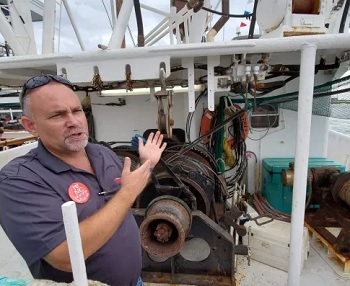
Anti-Commercial Fishing Lawsuit demands NC coastal fishing reforms
The N.C. Coastal Fisheries Reform Group, a nonprofit organization, has said the degradation of marine fisheries is the most significant environmental issue facing the state, and it is going to court to seek change. Joe Albea, a spokesman for the organization, said that “vast schools of croaker and gray trout all over North Carolina in the sounds and along the beach” were present in the 1970s and ’80s. “Through the years we have lost those great schools of fish,” he said. Brent Fulcher, whose fishing vessel, the Micah Bell, is named as a defendant“,, Glenn Skinner, executive director of the trade group the N.C. Fisheries Association, believes the lawsuit is without merit. >click to read< 14:44
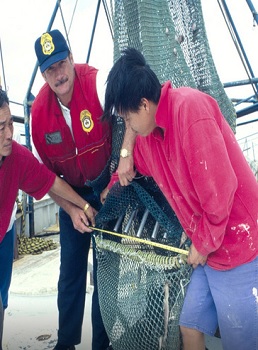
Turtlegate: Net Escape Doors Versus the Doors of Government
This week, a 50 pound Loggerhead was rescued on Cape Cod.,, Kemp’s Ridley turtles are endangered and although it cannot be confirmed if there is a direct connection between these cold-stunning incidents and interaction with fishing boats, trawler net entanglement remains the number one culprit for sea turtle trauma and mortality. huh! Let’s turn our attention to this critical man-made danger that affects all ocean mammals and sea life in general,,, we see where this is going, >click to read< 09:33
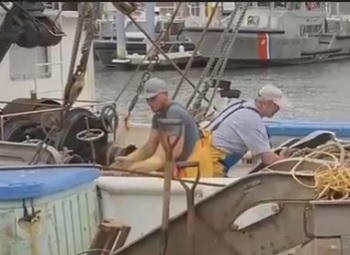
New Jersey fishermen to donate bycatch to NJ food bank
A new partnership between New Jersey fishermen and a local food bank will mean that some of New Jersey’s hungry residents will have plenty to eat.
For decades, a large portion of the fish caught by commercial fishermen in the United States has gone to waste.,,, But a new program launched in New Jersey Friday means that some of this wasted fish will be donated to Fulfill, the food bank of Monmouth and Ocean counties. “That fish gets turned over to the people in Monmouth and Ocean counties who need it the most. And there are a lot of them,” says former Lt. Gov. Kim Guadagno, the CEO of Fulfill. >Video, click to read< 10:14
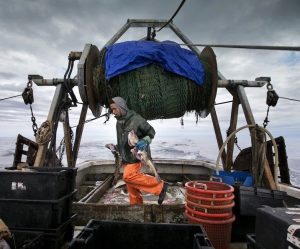
DC Circuit Sinks Challenge to Fishing Bycatch Rule
The D.C. Circuit on Friday upheld the government’s method of counting fish and other sea life that are unintentionally swept up in commercial fishing nets. The NMFS changed its method for counting bycatch in 2015,,, The 2015 change puts trained reporters, typically biologists, on a sample of fishing boats to count bycatch. Their numbers are then extrapolated across entire fleets, giving the government an estimate to work with. Conservation group Oceana challenged the new rule,,, >click to read<19:25

Controversial bycatch monitoring program coming to Maritime lobster industry
Canada’s Department of Fisheries and Oceans is rolling out a controversial bycatch monitoring program in three lobster fishing areas in Nova Scotia, but it won’t say when the program will be introduced across the Maritimes. The department is imposing at-sea monitors for the first time this fall in three lobster fishing districts in Nova Scotia from Halifax to Digby. The department said it needs to collect data on other species — such as cod, cusk and Jonah crab — that are inadvertently being caught in lobster traps, which is known as bycatch. The question is when the monitoring will roll out elsewhere. >click to read<11:14
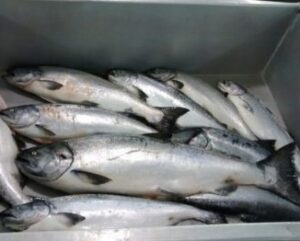
With New Kuskokwim King Salmon Data Released, Bering Sea Bycatch Restrictions Come Under Review
New state data reveals that the number of king salmon returning to the Kuskokwim River has been inflated for decades. Now, the state is recommending that the body governing the Bering Sea pollock fishery adopt this new information. If it does, restrictions on the fleet’s bycatch of king salmon could tighten, and a long-voiced demand from Kuskokwim residents could be met. The North Pacific Fishery Management Council is meeting in Kodiak, Alaska this week. It’s scheduled to make a decision by Monday on how many king salmon can be caught incidentally by commercial fishing boats targeting pollock in the Bering Sea. >click to read<08:33
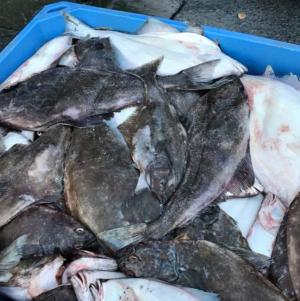
Halibut trash
Only in Alaska, which likes to claim title to the world’s “best-managed fisheries,” would halibut now retailing at prices in excess of $20 per pound be ground into fish meal to feed animals, shrimp and maybe even farmed salmon – the bane of Alaska commercial fishermen. Photos of halibut and other, trawl-caught bottomfish headed for the grinder emerged from Kodiak this weekend as Alaska fishermen started into a fishing season where the targeted harvest of halibut by both commercial fishermen and anglers has been seriously restricted because of conservation concerns. >click to read<18:20
Lawsuit seeks to protect whales, turtles from California gillnets
 Oceana filed a lawsuit seeking to force U.S. fisheries managers to implement plans for restricting the number of whales and turtles permitted to be inadvertently snared in drift gillnets used for catching swordfish off California’s coast. The proposed rule, endorsed in 2015 by the Pacific Fishery Management Council, would place numerical limits on “bycatch” of whales and other marine creatures, and suspend swordfish gillnet operations if any of the caps are exceeded. The regulation was expected to gain final approval from the National Marine Fisheries Service. But it was withdrawn last month after the Commerce Department agency determined the cost to the commercial fishing industry outweighed conservation benefits, agency spokesman Michael Milstein said on Thursday. click here to read the story 17:11 Geoff Shester, a senior scientist at Oceana, who was “furious” when he found out the National Oceanic and Atmospheric Administration (NOAA) had decided to against adopting the rule. (lmao!) click here to read 17:13
Oceana filed a lawsuit seeking to force U.S. fisheries managers to implement plans for restricting the number of whales and turtles permitted to be inadvertently snared in drift gillnets used for catching swordfish off California’s coast. The proposed rule, endorsed in 2015 by the Pacific Fishery Management Council, would place numerical limits on “bycatch” of whales and other marine creatures, and suspend swordfish gillnet operations if any of the caps are exceeded. The regulation was expected to gain final approval from the National Marine Fisheries Service. But it was withdrawn last month after the Commerce Department agency determined the cost to the commercial fishing industry outweighed conservation benefits, agency spokesman Michael Milstein said on Thursday. click here to read the story 17:11 Geoff Shester, a senior scientist at Oceana, who was “furious” when he found out the National Oceanic and Atmospheric Administration (NOAA) had decided to against adopting the rule. (lmao!) click here to read 17:13






